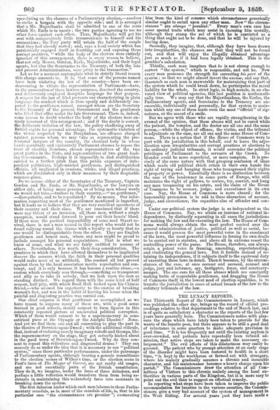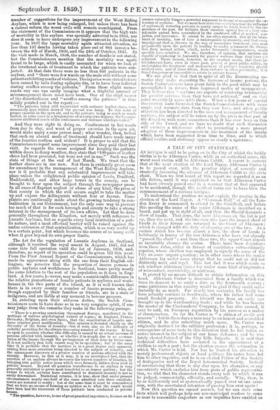THE LUNACY REPORTS.
THE Thirteenth Report of the Commissioners in Lunacy, which was published the other day, brings up the record of official pro- ceedings relative to that department to the end of March last, and is of quite as satisfactory a character as the reports of the last few years have generally been. The Commissioners notice with plea- sure the steps which have lately been taken to provide for the wants of the lunatic poor, but there appears to be still a good deal of reluctance in some quarters to make adequate provision in good time. " It is too frequently not until the existing asylum is over-crowded, and patients have repeatedly been refused ad- mission, that active steps are taken to make the necessary en- largement." The evil effects of this dilatoriness may easily be guessed. The patient who by prompt attention at an early stage of the disorder might have been restored to health in a short time, "is kept in the workhouse or farmed out with strangers, where his malady gradually assumes a chronic and incurable character, and his maintenance becomes a heavy charge upon his parish." The Commissioners draw the attention of all Com- mittees of Visitors to this chronic malady among the local au- thorities in various parts of the Kingdom, but it is more easy to point out the evil than to suggest an effectual remedy.
In reporting what steps have been taken to improve the public accommodation for lunatics in the various counties, the Commis- sioners give a very bad account of the system of management in the West Riding. For several years past they have made a
number of suggestions for the improvement of the West Riding Asylum, which is now being enlarged, but unless there has been a radical reform the worst evils will remain unmitigated. From the statement of the Commissioners it appears that the high rate of mortality in this asylum was specially adverted to in 1855, nor does it seem to have undergone any improvement in the following year. In 1857 the large mortality again attracted attention, no less than 157 deaths having taken place out of 844 inmates be- tween the 4th of March, 1856, and the 24th of October, 1857. At the visit made in March, 1858, the number of deaths is not stated, but the Commissioners mention that the mortality was again found to be large, which is easily accounted for when we look at the irrational mode of treatment to which the patients were sub- jected. At that date there were no less than 851 patients in the asylum, and " there were few wards on the male side without some patient exhibiting marks of violence. The injuries were stated tohave been caused by falls during epileptic fits, or to have been inflicted during scuffles among the patients." From these slight memo- randa any one can easily imagine what a frightful amount of mismanagement there must have been. One of the chief causes of the disorderliness and " scuffles among the patients " is thus mildly pointed out in the report:— "The patients, being still unprovided with ordinary leather shoes, were necessarily kept within doors if the ground was damp. To this want of proper exercise in the open air, and to the patients being so much in wards heated, in some eases to a temperature of seventy-two degreee, the Commis- sioners attributed much of the restlessness and violence which prevailed."
And they were right in doing so. Confinement in hot wards from day to day, and want of proper exercise in the open air, would make many a sane person mad ; what wonder, then, to find that such an absurd mode of treatment should have made many of the lunatics restless and violent ? It is proper to add that the Commissioners report some improvement since they paid their last visit. As regards the cause assigned for keeping the patients within doors in damp weather, they state that "100 pairs of leather shoes had been procured, but were not yet in use." Such was the state of things at the end of last March. We trust that the leather shoes are in use now. But there is evidently great room for amendment in the management of the West Riding Asylum, nor is it probable that any substantial improvement will take place unless the enlightened public opinion of- Leeds, Bradford, Huddersfield, and other large towns in the county, can be brought to bear upon the subject through the newspaper press. In all cases of flagrant neglect or abuse of any kind, the press of that county in which the evil occurs ought to take the matter up and expose the delinquents without fear or favour. Com- plaints are continually made about the growing tendency to cen- tralization in our Government, but the only sure way to prevent too much of that is for each borough and county to take a strong interest in the management of its own affairs. Let that be done generally throughout the Kingdom, not merely with reference to Lunatic Asylums, but as regards every local institution of a pub- lic nature, and a moat effectual barrier will be raised against the undue extension of that centralization, which is so very useful up to a certain point, but which becomes the source of so many evils when it goes beyond its own proper limits.
The Act for the regulation of Lunatic Asylums in Scotland, although it received the royal assent in August, 1857, did not come into full operation until the 1st of January, 1858, and, therefore, no report of its operation could be given till this year. From the First Annual Report of the Commissioners, which has made its appearance along with the one from their English col- leagues, we perceive that the proportion of insane persons in public asylums and workhouses in Scotland, bears pretty nearly the same relation to the rest of the population as it does in Eng- land. A. few years, however, may make a considerable difference in the relative proportions of lunatic patients in asylums and work- houses in the two parts of the island, as it is well known that there is in every county a number of insane persons who, al- though supported by their families or friends, are in a state of indigence, and are liable at any moment to become paupers. In entering upon their arduous duties, the Scotch Com- missioners seem to have done so in no very sanguine spirit, if one may judge from the remarks they make in the following passage.
" There is a growing conviction throughout Europe, manifested in the writings of various psychological writers of repute, in England, France, Germany, Belgium, and even Spain, that the constitution of lunatic asy- lums requires great modification. This opinion is founded chiefly, on the diversity of the forma of insanity—but it rests also on the difficulty of suitably providing for the always increasing number of the insane. It may be open to question whether this difficulty is caused by an actual increase of persons affected with insanity, or whether it is simply due to an accumu- lation of the insane through the prolongation of their lives by better care. It is not unlikely that both causes may be in operation ; but at the same time it is probable that the increase is in a great degree only apparent, arising from more attention being directed to the subject of insanity, and the consequent discovery of a greater number of persons affected with the malady. However, be this as it may, it is an ascertained fact, that the erection of an asylum always increases the known numbers of lunatics, by bringing into public notice cases which were formerly hidden from view in private houses. Beyond all question transference to an asylum is very generally calculated to prove most beneficial to an insane patient ; but the extent to which asylums have contributed to diminish insanity is not so easily determined. Statistical returns, it is true, show that under present circumstances nearly one-half of the eases admitted into these establish- ments are restored to sanity ; but at the same time it must be remembered that we have no means of forming an opinion as to what the result would have been had the treatment of these patients been conducted in private houses.
"The question, however, is one of great practical importance, because on its answer naturally hinges a powerful argument in favour of or agninst the ex, tension of asylums. But we must here state our coal-it:Hon that the influenoe of asylums in restoring patients to sanity cannot he fairly tested by the ex- perience of the past, for hitherto their curative agency has to a very con- siderable extent been neutralized by the combined effect of neglect, pre- judice, and ignorance. It cannot be too often repeated, that in the treat- ment of insanity, loss of time is unfavourable to recovery, and that every impediment that is thrown in the way of immediate treatment acts most prejudically upon the patient by tending to render permanent the aberra- tion from normal action, which, under twourable circumstances, would speedily have subsided. We are, therefore, of opinion, that asylums are capable of rendering to humanity for greater services than they have yet achieved. There cannot, however, be the smallest doubt, that these es- tablishments have, even in times past, proved of great public utility, by undertaking the treatment and management of patients requiring special medical care, and of those whom, from violence or other peculiarity, it is found dangerous or impossible to retain in private houses." We are glad to find that in °pito of all the discouraging re- marks they make regarding the increase of insane persons, the Scotch Commissioners have great faith in the good which may be accomplished in future, front improved modes of management.. They believe that " asylums are capable of rendering to humanity fur greater services than they have yet achieved," and on that point we entirely agree with them. W hen a few years of careful obs.m.vation have furnished the Scotch Commissioners with more ample and accurate data than they now have, and when public attention has been directed to the uses and management of lunatic asylums, the subject will be taken up by the press in that part of the Kingdom with more earnestness than it has ever been on this side of the Tweed, and we have no doubt that such discussion will exercise a wholesome effect in promoting a more prompt adoption of those improvements in the treatment of the insane which have been suggested from time to time, and to which official routine and obstinacy oppose so steady a resistance.



























 Previous page
Previous page